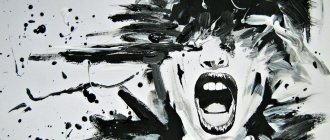The human psyche is the ability of the brain to sense and evaluate what is happening, creating an internal picture of the events that happened.
It is the created image that influences further attitudes towards life situations, things, subjects and oneself. A fictional performance is very different from real events, because it is filled with greater emotionality and brightness. In addition, the final judgment is often influenced by other stories that happened a little earlier.
Mental images that relate to some sensations are called primary. If they are based on memory or imagination, then they are called secondary. They greatly influence future attitudes towards certain situations and objects.
It is worth noting that only a living creature can have this property. The psyche of humans and animals is similar and is based on some general principles, but there are still significant differences. For example, in animals, decision-making is based only on specific situations, and motivation is only biological in nature. As for feelings, animals can also experience them, but their range is much smaller.
Scientific interpretation
The concept of scientists on the issue of the emergence of the psyche is as follows:
- According to scientists, the psyche appeared at a certain stage in the development of living organisms. It is a reflection of their manners, habits and actions. As living beings progressed, the psyche also developed. In its evolution, it went through two stages: instinctive and personal training.
- Psyche and consciousness are the culminating phase of evolution. This achievement arose thanks to active work, which took place in a society that was quite civilized for that time.
- The psyche in action has the strongest development. It is movement and activity that creates change. An important pattern is the transition of activity and any actions into a mental image, and vice versa.
- The human psyche is shaped by the functioning of the brain, but in fact it is an individual phenomenon that depends on social actions.
- Mental phenomena have a specific system and structural organization.
General concept of the psyche
The term “psyche” denotes a special aspect present in the life of such highly organized beings as animals and humans. This aspect lies in the ability to interact with the surrounding reality and reflect it with one’s states.
Among the processes and phenomena associated with the psyche are: perception, sensations, intentions, emotions, dreams, etc. The psyche acquires its highest form in the form of consciousness. Only man, of all living beings, has consciousness.
Group phenomena
The concept of “psyche” is quite broad, so it is not easy to explain it in one sentence or example. The structure of the psyche is supposed to be divided into four main groups: properties, processes, qualities and states.
1. Properties. Mental properties are personal qualities and characteristics that belong to a particular person. They can be repeated in other individuals or be exclusively individual.
In addition, these characteristics can be passed on to other generations. These traits include the properties of the nervous system (strength, mobility, calmness, etc.).
We recommend: Psychic reflection is
2. Processes. These are qualities that received their definition in the process of life. They are based on some knowledge, observations and feelings. Two types of processes can be distinguished:
- Cognitive (memory, thinking, imagination, sensations, etc.).
- Emotional-motivational (emotions, motivation, feelings, etc.).
3. Qualities. These traits appear due to the environment, as well as the genes of the parents (character, intelligence, emotionality, etc.).
4. Condition. Reflects the degree of human performance. Conditions depend on physiological characteristics and external influences (mood, inspiration, etc.).
Comparison
Cognitive abilities
Both people and animals perceive what is happening and remember information. But a person has a special perception - objective and meaningful. There is debate about the imagery of perception in higher animals. Memory only in humans can be voluntary and indirect.
For animals, knowledge of reality only ensures adaptation to environmental conditions. And those who have adapted better survive. A person knows how to see existing patterns and compare facts. Thanks to this, he can predict events and even influence their course. In addition, people have the ability to self-knowledge, which allows them to control themselves and engage in self-education and self-improvement.
Features of thinking
Creatures of both species possess at least basic practical thinking. But the difference between the human psyche and the animal psyche is that only people think about and plan upcoming affairs, set goals and picture the expected result in their heads. An animal can create something that is striking in its correctness (for example, a honeycomb), but there is no talk of presenting the result here.
An animal, performing any actions, is not able to go beyond the existing situation. It thinks specifically, based on what it sees and feels at the moment. A person, being in a certain situation, can mentally break away from it, calculate the steps and consequences. In other words, he is endowed with the ability to think abstractly. In addition to this, human thinking is capable of taking a verbal-logical form, while animals have no access to either logical operations or understanding of words.
Emotions and feelings
It is common for both humans and animals to experience emotions. And they can manifest themselves in a similar way. But man is the only creature that also has feelings. This is expressed in people’s ability to empathize, regret something, be happy for another, enjoy the sunset, etc. If emotions are given by nature, then moral feelings are cultivated precisely in social conditions.
People communicate using speech. This instrument contributes to the transmission of social experience, which has a very long history. Thanks to speech, a person has the opportunity to obtain information about phenomena that he has never encountered personally. Animals make vocal signals. Such signals can only be associated with phenomena limited to the present situation or emotions experienced at the moment.
Development conditions
You can see what the difference is between the human psyche and the animal psyche by analyzing what is required for its formation in each case. Thus, the mechanisms of development of the animal psyche do not go beyond biological boundaries, and in human society any individual will manifest itself only as an animal. A person becomes a personality and his psyche develops only among other people, when communicating with them, assimilating the experience of all mankind. In this case, the socio-historical factor is decisive.
Source
Functions
Mental functions represent individual characteristics inherent in a particular individual. They help a person cope with various situations in life.
During evolution, not only physical abilities developed, but also the human psyche and brain. Animals also achieved some changes, but it was man who was able to achieve more advanced modifications.
Each person has his own unique psyche, and the state of mind is influenced by the world around him. It is in communication that people progress, so creating the right environment is very important.
We recommend: Freudian Psychoanalysis
For example, if a child is deprived of society from birth, he will behave like Mowgli, resembling a wild animal. In this case, the psyche as something neglected will not develop. There are several functions of the psyche that can be distinguished:
1. Cognitive. This function forms the foundation for the rest. It exists in all living organisms in the world. Flowing through the nervous system, it affects the brain, creating the effect of a mirror reflection of any situations and things. However, it takes into account the individual qualities of the individual.
Cognitive function has special features:
- A stable psyche always continues to develop, because the world around us also evolves.
- The psyche as a subject of psychology tends to change under the influence of the psychological characteristics of an individual, his emotions and sensations at a particular moment in time.
- The real world exists for a person in pictures that he forms throughout his life, relying on smell, taste, sight, hearing and other senses.
2. Regulatory. Consciousness adapts to external influences, creating within the individual an incentive for certain actions and behavior.
Thanks to it, the personality creates a certain system of movement in reality:
- Realizes his desires and needs in a specific period.
- Understands the tasks.
- Comes up with methods to solve problems and achieve results.
This function helps you react thoughtlessly to external stimuli.
In this case, the feelings that a given stimulus awakens play a big role. It is the emotions experienced that will influence the volitional qualities that are so necessary for making decisions. 3. Communicative. Communication is the main link of interaction with other individuals. It is the signs that the interlocutor hears during the conversation that give him the opportunity to draw conclusions about a particular person.
Communication forces other people to unite together, because this way goals are achieved faster. It has two types:
- Verbal (speech).
- Non-verbal (facial expressions, gestures).
Even in the primitive era, man came up with means of communication that significantly influenced his consciousness, although he did not understand it. For example, by taking a spear in his hand and briefly exchanging some judgments with his tribe, he could catch his prey faster. In addition, communication skills in tandem with certain experience were greatly useful to new generations.
It is worth noting that it was man who was the only one who was able to move from nonverbal communication to higher forms of communication.
4. Emotive. This function is responsible for the state of mind and feelings of the individual. The world around us and its manifestations evoke specific emotions, which subsequently create a mood.
Very often, feelings collide with the function of thinking, thanks to which a person makes more rational decisions. That is why sometimes you should not act rashly, but think everything over carefully. Decision making is no longer based on emotions, but on what is vitally important at the moment.
Recommended: What is the placebo effect?
For example, a small part of an apple has a rotten spot that causes disgust and dislike in us. If we are guided only by feelings, then the apple will immediately go into the trash. However, you can cut off this part, because the other half is suitable. Such smart decisions leave a noticeable mark on our lives.
5. Conative. A healthy psyche initially reacts to certain actions and behavior. Thanks to them, a person forms an attitude that has a clear course.
An example would be the situation with selecting a nanny for a child. For example, two candidates who have higher pedagogical education come for an interview. However, the first has extensive experience in such work, while the second does not.
Of course, mom would choose the first specialist, but this teacher behaves too reserved and cold, unlike the other nanny. Thus, the second woman suits the inexperienced mother, because it will be easier to build communication and establish communication with her.
We recommend: Basics of psychogenetics
This preference occurs unconsciously, because it is obvious that the first candidate is objectively better. However, the conative function does its job.
The difference between the human psyche and the animal psyche
Comparing the animal psyche with the human psyche allows us to highlight the following main differences between them.
1. An animal can act only within the framework of a situation that is directly perceived, and all the acts it performs are limited by biological needs, that is, motivation is always biological.
Thinking is closely related to broadcasting. Animals only give signals to their relatives about their own emotional states, while humans use language to inform others in time and space, conveying social experience. Thanks to language, every person uses experience that has been developed by humanity over thousands of years and which he has never directly perceived.
2. Animals are capable of using objects as tools, but not a single animal can create a tool. Animals do not live in a world of permanent things and do not perform collective actions. Even watching the actions of another animal, they will never help each other or act together.
Only man creates tools according to a well-thought-out plan, uses them for their intended purpose and saves them for the future. He lives in a world of permanent things, uses tools together with other people, takes on the experience of using tools and passes it on to others.
3. The difference between the psyche of animals and humans lies in feelings. Animals are also capable of experiencing positive or negative emotions, but only a person can sympathize with another person in grief or joy, enjoy pictures of nature, and experience intellectual feelings.
4. The conditions for the development of the psyche of animals and humans are the fourth difference. The development of the psyche in the animal world is subject to biological laws, and the development of the human psyche is determined by socio-historical conditions.
Both humans and animals are characterized by instinctive reactions to stimuli and the ability to gain experience in life situations. However, only a person is capable of appropriating social experience, which develops the psyche.
From the moment of birth, the child masters how to use tools and communicate skills. This, in turn, develops the sensory sphere, logical thinking, and shapes the individual’s personality. A monkey in any conditions will manifest itself as a monkey, and a person will only become a person if his development takes place among people. This is confirmed by cases of human children being raised among animals.
Source
Development in psychology
Psychology studies social communications and behavior, their connection with mental phenomena, as well as the dependence of the development of these phenomena on them. Currently, there are many innovations and conclusions in psychology that are associated with constant changes in people and their psyche. The immediate goals in this science are:
- Disclosure of the principles of the psyche.
- Identification of a certain chain of logical means and positions.
- Acceptance of a system of mental activity.
- Study of the nature and manipulation of different mechanisms along with other branches.
Over the course of several decades, a list of psychological areas has been created that are engaged in completely different research. Scientists present new hypotheses and theories to the world.
Thus, psychology is a science that analyzes events and patterns of the psyche. Determining some relationships takes a long time, but is very significant for the development of science. Author: Lena Melissa








